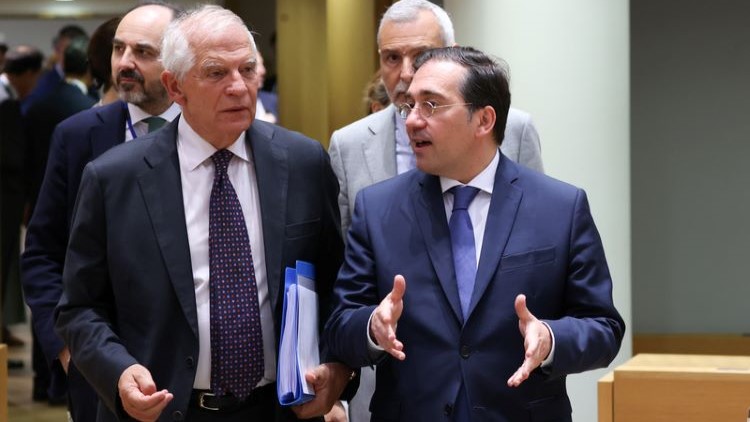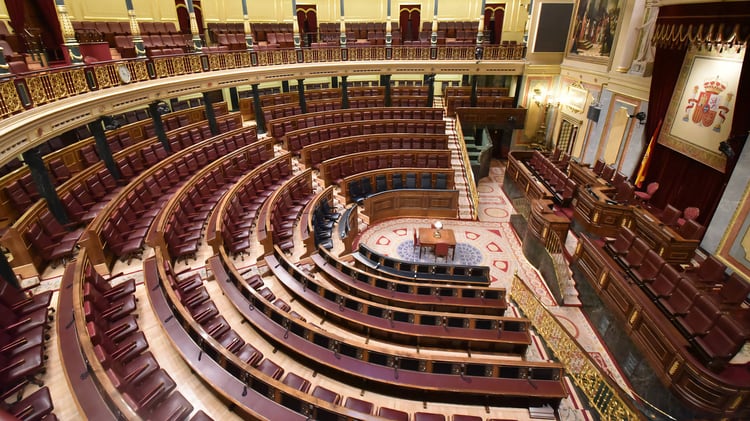Eduardo González
The acting Minister of Foreign Affairs, José Manuel Albares, participates today in Luxembourg in an EU Foreign Affairs Council (FAC) that is particularly charged due to the serious security crises that the world is going through, especially Russia’s aggression against Ukraine, the situation in Nagorno-Karabakh and the confrontation between Israel and Hamas.
The Council, chaired by the EU High Representative for Foreign Affairs and Security Policy, Josep Borrell, will hold a debate on Russia’s aggression against Ukraine “focused on security commitments”, according to the EU in a press release.
In line with the G7 joint declaration of support for Ukraine of 12 July, signed by the EU, and Ukraine’s own aspirations, security commitments cover security and defence, as well as economic stability, resilience, reconstruction and financial and reform support. At today’s meeting, ministers will focus on security and defense aspects, in particular the supply of military equipment and training, strengthening the EU defense industry, civil support and demining.
Precisely, the FAC will take place three weeks after the heads of European diplomacy met on October 2 in Kyiv to address the situation in Ukraine. In that historic and absolutely unforeseen Council, the first to be held outside the EU and convened without any prior announcement for security reasons, “all” the foreign ministers “agreed” to “continue supporting Ukraine for as long as possible.” necessary, that we must fight against impunity and that we must help Ukraine on its path towards the EU,” according to Albares told the press.
On October 5, the president of Ukraine, Volodimir Zelensky, participated in Granada in the third meeting of the European Political Community, where he received the unanimous support of fifty European heads of state and government in the face of Russian aggression.
Naborno-Karabakh
On the other hand, opinions will also be exchanged at the FAC in Luxembourg on developments related to Armenia and Azerbaijan. Azerbaijan launched a lightning military operation on September 19 against Nagorno-Karabakh, a majority Armenian territory whose sovereignty belongs to Azerbaijan but which maintained a high degree of autonomy. The FAC will focus on how the EU can improve its support to Armenia and continue to support the normalization process in the region.
The EU remains committed, at the highest level, to the normalization of relations between Armenia and Azerbaijan, based on the principles of sovereignty, territorial integrity and inviolability of borders. The president of the European Council, Charles Michel; French President Emmanuel Macron and German Chancellor Olaf Scholz met with Armenian Prime Minister Nikol Pashinyan on October 5 on the sidelines of the European Political Community Summit in Grenada.
On the same day, the Commission announced a series of measures to support Armenia, including a humanitarian package of €10.45 million and €15 million in budget support, as well as technical assistance and support under the Investment Plan. EU Economic Funds (up to 2.6 billion in investments) and within the framework of the EU4Peace programme. Separately, following an invitation from Charles Michel, the leaders of Armenia and Azerbaijan are expected to meet again in Brussels before the end of October to continue the normalization process.
On October 3, Borrell condemned, before the European Parliament and on behalf of the EU, “the use of force by Azerbaijan in Nagorno-Karabakh” and asked that “Armenia and Azerbaijan resume dialogue and take positive steps towards the delimitation of borders, security, connectivity, humanitarian issues and a broader peace treaty.” “The European Union is ready to support this process,” he added.
Middle East
The third major item on the agenda is, inevitably, the situation in the Middle East “following the brutal and indiscriminate terrorist attacks by Hamas against Israel and the events unfolding in Gaza,” the Council continued. Ministers will address, among other topics, collaboration with regional actors to avoid collateral effects, protection of EU citizens and consular assistance, the humanitarian situation in Gaza and the EU’s long-term commitment to the peace process. peace in the Middle East. Separately, the Commission will brief ministers on the provision of humanitarian assistance and on the ongoing review process of EU development aid to the Palestinian Authority.
The debate takes place a few days after the Spanish Presidency of the Council of the EU proceeded to fully activate the Integrated Political Response to Crises mechanisms to support the constant monitoring of the situation and to expedite and coordinate decision-making. decisions at the political level.
On October 16, the leaders of the European Union participated by videoconference in an extraordinary European Council to unify the positions of the Twenty-Seven and the European Commission. During that meeting, the 27 agreed on the need to maintain a “united and firm” position against the terrorist attacks by Hamas and ratified the common position agreed on last October 15, which includes Israel’s right to defend itself within international law and humanitarian. Likewise, they committed to intensifying dialogue with Israel and with all countries in the region to avoid a regional escalation of the conflict and to reinforce humanitarian aid to Palestine.
To conclude today’s day in Luxembourg, EU foreign ministers will attend the 19th EU-Central Asia ministerial meeting with Kazakhstan, the Kyrgyz Republic, Tajikistan, Turkmenistan and Uzbekistan.







